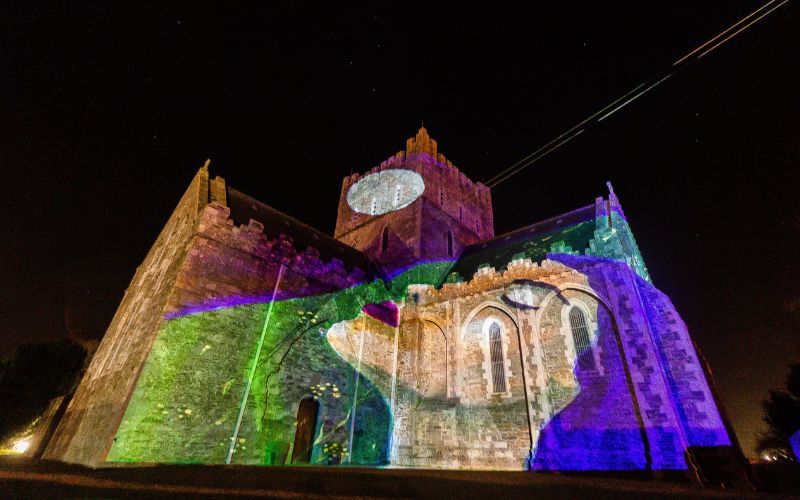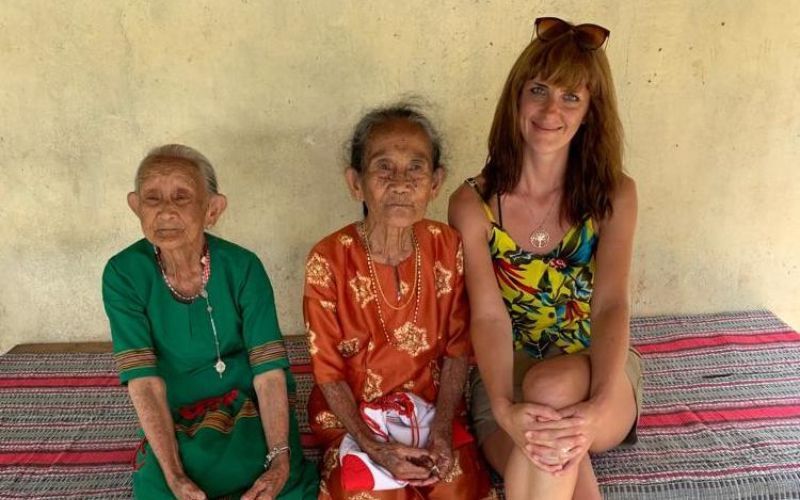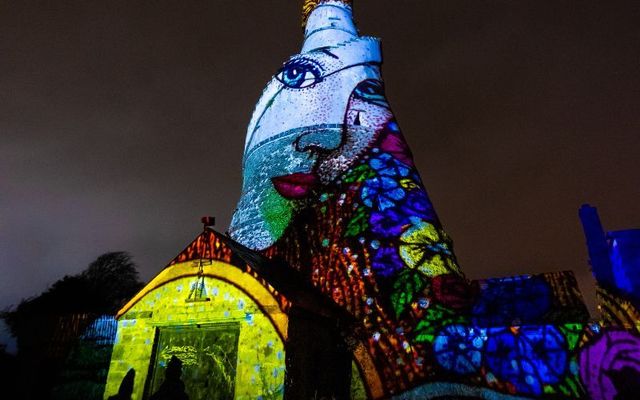Melanie Lynch, the founder of Herstory and one of the leaders who successfully campaigned to make Brigid’s Day Ireland’s new national holiday - the first to honour a woman, reflects on her personal feminist journey in a nation reconciling its troubled past, and the opportunity to heal the rift between Christianity and pagan Celtic spirituality.
The empty church pews left by the abuses of the Church have led to the painful loss of spirituality in Ireland. The void is palpable. I believe Brigid - Woman, Goddess, and Saint - offers the chance to heal this wound that cuts to the heart of society.
Brigid’s Day is an invitation to stop the pointless millennia-old war of Christianity versus paganism, to finally see beyond the duality, to the wisdom and beauty in both lineages. It’s not a question of choosing one or the other. A visionary future dances with the harmonising nature-centred philosophy of Celtic spirituality and the compassion, kindness, and non-judgement of true Christianity.
Initially, I was reluctant for Herstory to start a campaign to make Brigid’s Day a national holiday and risk embroiling our spirited feminist movement in the contentious tangle of the Catholic Church.
Ireland is emerging from a perpetual Winter of colonialism, famine, war, poverty, patriarchy, and emigration. We are only beginning to process the trauma created by the church - the Magdalene Laundries, Mother and Baby Homes, and clerical sexual abuse - and release the shackles of shame that feel so far removed from the liberating wisdom of true Christianity.
In one generation, Ireland has transformed from No Country for Women to a world leader in equality. Brigid’s Day is our first national holiday to honour a woman: our Saint and Goddess. It’s a glimpse of a young nation that is rising to heal its past.
The time has come to write a new story of unity by celebrating Brigid and all women, a proclamation of an "Ireland of Equals" and the realisation of the 1916 Rising vision that made Ireland the first country in the world to promise equal rights and religious freedom to all men, women, and children.
Brigid’s Day marks the return of the light and first day of Spring, known as the festival of Imbolc and the feast of the Goddess in the ancient Celtic calendar. In Modern Ireland, it heralds the return of the Goddess. The first of February is also the feast day of Saint Brigid, an extraordinary woman who lived 1500 years ago.
Truth be told, Ireland is still catching up with the visionary Saint Brigid. She represents the best of Christianity, as an activist for human rights, animals, and the poor. A Robin Hood character, she would redistribute her father’s wealth with those who were less fortunate. Brigid was an environmentalist centuries before the climate crisis. In "The Life of Brigid," her biographer Cogitosus reveals Brigid was a charismatic leader who founded a double monastery from the Early Christian tradition. Within 100 years of her death, there was a thriving monastery of men and women, living and practising their faith equally.

2022 Herstory Light Show illuminating Kilkea Castle with Transition by Courtney Davis.
The Goddess Brigid was a pan-European Celtic goddess, honoured from Turkey to Spain. She offers a window into our ancient past and the wisdom of Celtic spirituality, rooted in a deep and joyful reverence for nature. In this era of ecological crisis, it’s time to reawaken our innate symbiotic love for Mother Earth and in the words of philosopher John Moriarty, ‘remember how to walk beautifully on the earth again.’
Evidently, the fall of mankind was not when Eve took a bite from the biblical apple - it was the delusional Old Testament notion that man should have dominion over the earth and living beings. This was the beginning of humanity’s downfall. On the edge of environmental catastrophe, the only way for humanity and the earth to survive and thrive again is to heal the separation in our consciousness, the split from our true nature and our symbiotic relationship with the Earth.
Leading the Brigid’s Day campaign required me to hold up a mirror and question my faith, in the hope of healing the polarity in my ancestral heritage. Spirituality is deeply personal and I don’t believe it should be dictated by dogma or doctrine. My quest has been in search of wisdom that inspires, empowers, and liberates.
In the eyes of the Irish State and Church, I was born illegitimate in 1986. By law, I could not own land or be a civil servant. A lesser human of sorts, I could have been born in a Mother and Baby Home and incarcerated in a Magdalene Laundry.
On reflection, it’s surprising that I had a positive experience of Christianity. Fortunately, I was born into a family that only showed me love and kindness, ironically the true Christian ethos. Growing up in rural Ireland, we had young, dynamic priests in my hometown of Mullingar who effortlessly connected with us.
My grandmother Lily had a beautiful faith and by osmosis, she gifted this to her children and grandchildren. I never heard her say the words hell, sin, or guilt. Instead, she chose to focus on the light, love, and kindness of Christianity. Her faith gave her a deep well of courage and peace. This was palpable when I was lucky to be in her presence and it had a profound effect on me. At 97 years of age, she talked openly about her passing and there was no fear in her voice. What a gift.
As a teenager, I was bullied out of a Catholic convent school and escaped to Wilson’s Hospital, a liberal, multi-denominational school where all faiths were welcome. This open-minded education inspired me to continue exploring many traditions from around the world; from Islamic Sufi mysticism to Buddhism and indigenous spirituality.

Dee Mc Kiernan’s Brigid illuminating Kildare Cathedral.
On a Buddhist retreat in the heart of Ireland, it became clear from a basic understanding of duality, that it is fundamentally impossible to be sexist and reach enlightenment. Therefore Jesus was a feminist and this explains why so many influential women and female disciples are in the Bible. If only the church fathers could follow in his path.
In the illuminating journey of reconciling my Irish roots, I travelled to distant lands to meet with indigenous cultures, to listen to their stories, their dance with faith, and experiences with missionaries.
I have witnessed indigenous cultures express their openness to mono-theistic religions whilst preserving their original nature-loving pagan spiritual traditions. The Dayak tribe, guardians of the Borneo rainforest, have adopted some beautiful aspects of Christianity and you will find The Last Supper - with Mary Magdalene portrayed as the woman beside Jesus - hanging in some Dayak homes. However the Dayak maintain that nature is still their greatest teacher and they are nourished and inspired by their harmonious and symbiotic relationship with Mother Earth.
On Sulawesi island in Indonesia, I met with grandmothers of the Toraja tribe who regaled their experiences of the arrival of Christian missionaries and their negotiations with the preachers who sought to convert this formidable culture to Christ. The Toraja had no interest in adopting the idea of hell as their culture already looked forward to paradise and could only relate to the Christian idea of heaven. The women were quick to see through the patriarchal ideology of the Catholic Church and were forthright to assert the equal rights of women in their culture. This was non-negotiable.

Toraja grandmother’s and Herstory founder Melanie Lynch.
Closer to home, Brigid led me to the Irish philosophers of Celtic Christianity - John Moriarty and John O’ Donaghue - and my collaborations with artists like Myriam Riand and Áine O’ Brien in Herstory’s Sovereignty project.
Personally I had to separate Christianity from the Catholic Church. I delved into Gnostic Christianity, the lost teachings of Mary Magdalene, the stories of Saints Francis and Clare of Assisi, Padre Pio and the Essene way. Brigid has been a wonderful gift and healing force in my own spiritual journey. I don’t have to choose between the Goddess or the Saint - both speak to me and their wisdom is a bottomless well of inspiration. I hope she sparks your heart too.
You can discover more about Brigid, Herstory’s campaign, and the spectacular Festival of Light on Herstory.ie.




Comments